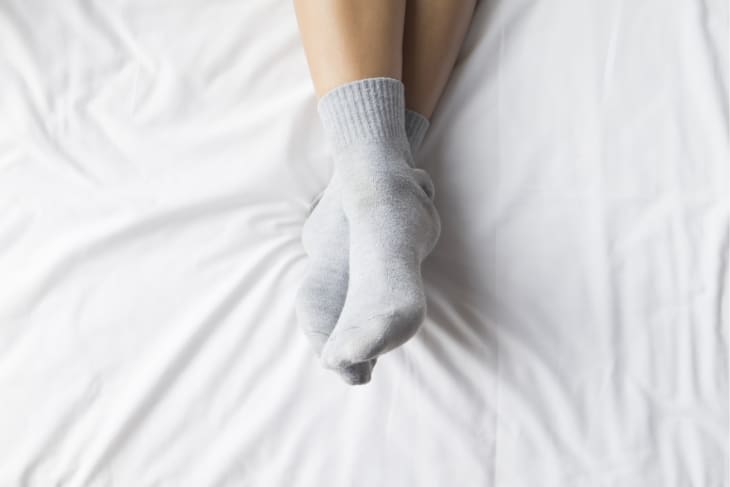The Science Behind Sleeping with Socks On

My friend’s face turned to a scowl as her jaw slowly dropped open. “No way!” she shrieked in disgust, gripping her coffee mug with rage. My friend looked like I had just confessed a crime to her, but really, all I shared was my opinion on sleeping in socks.
At the risk of doxxing myself, I’ll admit it: I almost always go to bed with socks on. I’m just drawn to the toasty feel of my feet under a pile of heavy blankets, like an extra layer of protection against the imaginary elements in my bedroom. Sure, sometimes I wake up sockless. But the important thing is, I slept soundly because I started the night out with my favorite wool companions, cozy on my feet.
Like politics, finances, and religion, sock-sleeping is one of those topics you want to avoid at the dinner table, unless you’re ready for a heated debate. As evidenced by my friend’s dramatic response, people have very strong opinions about socks as a bedtime accessory. A customized poll by Go Branded found that about 44 percent of U.S. consumers hate going to bed with socks on, 28 percent love it, and the remaining 29 percent have mixed feelings (maybe, like me, they tend to wake up with just one sock on). Equally convinced my preference is correct and curious why others would disagree, I set out to find out what, exactly, makes sleeping with socks on so unbearably horrible for the 44 percent.
The Pros and Cons of Sleeping With Socks On
Our opinions about sleeping with socks on probably have more to do with science and psychology than simple personal preference. Sleeping with socks on can help balance your body temperature while you’re sleeping, increase blood flow to your feet, and psychologically, you just might feel more comfortable with socks on or off.
1. Regulate your temperature
Let’s start with the science of sleep temperature and work our way down to socks. Consensus is, colder is better when it comes to sleep: In general, according to Cleveland Clinic, the best sleeping temperature for adults is between 60 and 67 degrees Fahrenheit. The body naturally cools itself off to promote sleep, and turning down the thermostat can help facilitate this natural process. If a sleeping environment is too hot or too cold, chances are you’ll wake up more, compromising the quality of REM sleep. So the argument could be made that sleeping with socks on, if you’re prone to getting warm at night, might be disruptive. The same argument stands that for those who get cool at night might sleep better with socks on.
If we’re being precise about body-temperature fluctuations, then science leans in the favor of socks on, says Mike Kisch, CEO and founder of sleep-tracking wearable Beddr. “The human body undergoes changes as it drifts into the early phases of sleep, and the body’s temperature slightly fluctuates throughout the night,” he says. “Although your temperature drops ever so slightly—a completely natural phenomenon—a pair of socks on your outermost extremities can help maintain balance.”
2. Increase blood flow
Socks can also prepare the body for sound sleep because they promote vasodilation, or the dilation of the blood vessels, and help increase blood flow in and around your feet. “Like other signals that your body sends to itself when sleep is imminent, the occurrence of vasodilation lets your body know that it’s time to go to bed,” Kisch says.
3. It could be more (or less) comfortable for you
But the science of sock sleeping extends beyond basic physiology. What we wear to bed—and how what we wear makes us feel—is also psychological.
For me, socks as a pajama add-on represent a feeling of safety and warmth, which Kisch says is key for some people to fall and stay asleep. But for some, socks have the opposite effect. “Despite the medical benefits of wearing socks to bed, many people still find the feeling of wearing socks in bed to be constructive or unhygienic, or they fear that they may overheat and wake up from being too hot,” he says.
For Kisch personally, the decision not to wear socks to bed is more a matter of overthinking than anxiety. “I can wear them all day long and it feels totally normal, but at night I become very conscious of extra clothing, including socks. I also feel that when I wear socks, my feet become harder to move around under bedding,” he says. “It’s a very small difference, but one that is magnified when attempting to sleep because we become more sensitized to our bodies as our stimuli go away.”
So what’s the verdict? Which portion of the population is right? Since evidence points both ways, I say we all win. Sleep how you want, as long as you sleep—socks or not.